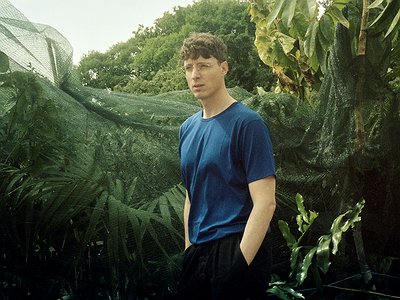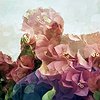Name: Kasper Bjørke
Occupation: musician/producer/DJ
Nationality: Danish
Current Release: The Fifty Eleven Project on Kompakt Records
Recommendations: Landon Metz creates abstract paintings, that have a calm, minimalistic language with a sense of rhythm, repetition and movement. In that sense, there is a lot of music in his work. I am honoured that he painted three works especially for the cover of The Fifty Eleven Project album. Landon was listening to the album demos when he was painting the works and they really speak to the music and vice versa. / David Byrne – How music works. This book is truly inspiring. David Byrne discusses form and the influence of music in a non-linear narrative, combining music theory, while telling personal stories from his amazing career as the front man in Talking Heads, one of my all-time favourite bands. I recently saw him perform live for the second time in my life and I was blown away by his presence and stage performance.
Website/Contact: If you enjoyed this interview with Kasper Bjørke visit his website www.kasperbjorke.com for more information.
When did you start writing/producing music - and what or who were your early passions and influences? What is it about music and/or sound that drew you to it?
I started in 1998 with the classic bedroom producer setup together with one of my friends. We used an Atari gaming computer with Cubase and an Akai mono sampler. It was super lo-fi but it also somehow sounded quite cool. We were very inspired by both the New York house scene like Masters At Work and the French wave of the mid 90s - especially Daft Punk and the Versatile crew etc.
Around that same time, I had started going to house parties in Copenhagen I was very drawn towards the club culture. I thought it was fun to dance all night and listen to DJs play tunes that I had never heard before. It was like discovering music all over again after having listened to mainly hip hop as a teenager.
For most artists, originality is first preceded by a phase of learning and, often, emulating others. How would you describe your own development as an artist and the transition towards your own voice? What is the relationship between copying, learning and your own creativity?
Yeah, when I first started out I was definitely trying to copy that French and US disco house sound that was around at the time – which was very influenced by the disco sound of the 70s and also using original disco samples to some extent. In the early 2000s I started to discover old post disco records, very much after listening to Trevor Jackson’s DJ Kicks compilation under his Playgroup moniker. That opened up a whole new world of inspiration that became a huge influence on my own solo records. A lot of the bands from that era were making music on drum machines and synthesizers so they were easier to re-create myself without actually sampling any records – and that was the first step towards finding my own sound, I think.
On my second solo album (Standing on top of Utopia from 2010) is when I sort of separated myself from emulating others and found my own sound. I think every artist is initially inspired by something or someone, who came before him/her. From then on, it is a long process of separating yourself from the inspiration rather than copying it. And then it’s a matter of not staying too long with your own sound but also developing it so you don’t get stuck in the same place; find new inspiration and new ways of keeping it interesting both for yourself and for others to listen to.
What were your main compositional- and production-challenges in the beginning and how have they changed over time?
As a producer, I started in a duo setup, so it was a challenge to have final say on the production as we needed to agree on everything. In that sense, it was not until I started releasing solo records around 2005 that I could really develop my confidence as a producer completely. I have always mixed my own releases as well - and in general I feel very confident as a producer now.
I am not a trained musician so I always had to use my ears. For the first years I struggled explaining to session musicians when I couldn’t explain the actual notes but little by little I started to learn more about notes and playing keyboard. I do still rely on musicians that really know their instrument so I might bring in a bassist or a live drummer if I need it.
What was your first studio like? How and for what reasons has your set-up evolved over the years and what are currently some of the most important pieces of gear for you?
After that first bedroom studio setup, we got a nice 30m2 studio in a complex where a lot of the successful producers from Copenhagen were based at the time. We had a vocal booth and a huge mixing desk and quite a lot of outboard gear. I never really felt we needed all that gear and it was maybe a bit more of an obstacle than anything else, coming from just an Atari Computer and a sampler. My studio now is somehow a combination of those two, based in my combined studio and home, a large apartment in Copenhagen. The studio itself is just one room - but I have made it pretty nice with padding on the walls and also my DJ setup with vinyl in there. I got rid of most of the outboard gear that I had left over the years - and now I mainly use soft synths and instead I go to other analogue studios when I need to, for example, record synthesizers. In that sense, I am not a gear freak but I get excited when I go to other studios and record there. I like that freedom and balance.
So, in that sense I don’t really have any important pieces of gear…
How do you make use of technology? In terms of the feedback mechanism between technology and creativity, what do humans excel at, what do machines excel at?
Things can happen by coincidence when you sit and programme in your DAW, in my case it is Logic. That can be drum patterns or a synth line in Midi, and then it’s about grabbing onto that “glitch” and using it for something that would otherwise not have happened, instead of hanging on to your original idea. I love that. Using preset sounds also in the mix phase on compressors and reverbs etc - it gets super uninspiring if you don’t fiddle around with the sounds on your own.
The computer excels in the sense that it gives you a chance to go back in time to what you did before if you don’t like a new idea you came up with.
Where it is more difficult with - for example - analogue synthesizers when you lose the sound you had come up with while twisting the knobs – or forgot a certain line that you just played. On the other hand, this is where it’s fun to just hit record and then edit around afterwards.
Production tools, from instruments to complex software environments, contribute to the compositional process. How does this manifest itself in your work? Can you describe the co-authorship between yourself and your tools?
On my latest ambient project album, The Fifty Eleven Project, I recorded the foundations for the album together with a close friend of mine in his studio with all the analogue synthesizers and effects you can dream of. Working so hands on with these old machines and getting that feeling of just pressing record and not using the computer for anything other than a recording device, is a huge inspiration in itself. I think it’s something that very few producers do these days. You sort of lose control when you record like that and amazing things happen during this process.
On my previous solo albums, I have been much more in control and used the computer as the main machine, programming everything myself. I always record analogue instruments to add colour and - to me personally, important non-quantized Midi feeling. But the base of my old albums came from drum programming in Midi and quite a lot of soft synths. One of my skills as a producer, I think (hope), is that I am quite good at camouflaging that the music is mainly software composed/produced.
Collaborations can take on many forms. What role do they play in your approach and what are your preferred ways of engaging with other creatives through, for example, file sharing, jamming or just talking about ideas?
Collaborating is part of my DNA as a producer. I often find the music I make all on my own a bit too one dimensional somehow - so I really like to work with musicians and vocalists to get that extra flavour that it brings into the music. Jamming can be fun and great things can come from it, but I often lose patience and might have a strong idea that I want to do already. For example, I might have written a bass line in Midi that I want to be played on an electric bass, so I bring in a musician to re-record just that line. Of course, I am open to trying different things out during the session – but often I more or less stick to that same note progression.
Could you take us through a day in your life, from a possible morning routine through to your work? Do you have a fixed schedule? How do music and other aspects of your life feed back into each other - do you separate them or instead try to make them blend seamlessly?
I am not full time in my studio. I have many meetings and (too) many emails - since I also work with music management for other artists, including Trentemoller and Goss. Because I have the advantage of living in this huge combined studio and private space, I can be very flexible in terms of quickly run into my studio and lay down some sketches and ideas and then come back to them at a later point when I have more time to focus on them. Because I also have a four-year son, I like to keep my studio work during the day while he is in kindergarten between 10 am and 4 pm. It is rare that I work at night, I am simply too tired and busy with the family routine… but of course inspiration sometimes comes at strange hours so in that sense it’s also really nice to have the opportunity to quickly sit down and start recording any time of day.



